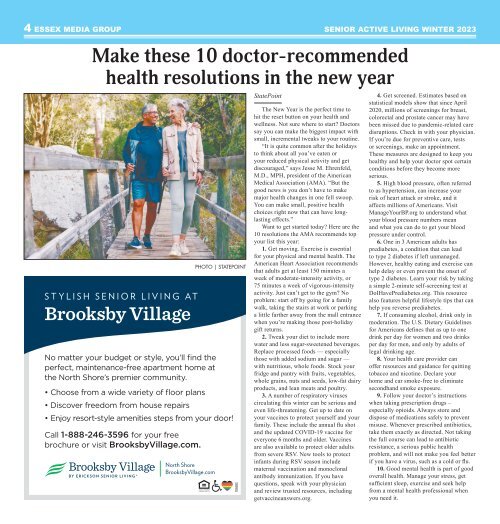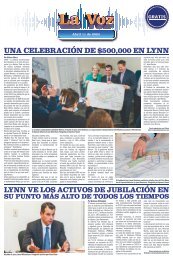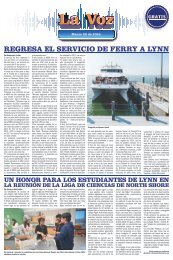Senior Active Living Winter 2023
Create successful ePaper yourself
Turn your PDF publications into a flip-book with our unique Google optimized e-Paper software.
4 ESSEX MEDIA GROUP SENIOR ACTIVE LIVING WINTER <strong>2023</strong><br />
Make these 10 doctor-recommended<br />
health resolutions in the new year<br />
STYLISH SENIOR LIVING AT<br />
Brooksby Village<br />
No matter your budget or style, you’ll find the<br />
perfect, maintenance-free apartment home at<br />
the North Shore’s premier community.<br />
• Choose from a wide variety of floor plans<br />
• Discover freedom from house repairs<br />
• Enjoy resort-style amenities steps from your door!<br />
Call 1-888-246-3596 for your free<br />
brochure or visit BrooksbyVillage.com.<br />
North Shore<br />
BrooksbyVillage.com<br />
PHOTO | STATEPOINT<br />
766685<br />
StatePoint<br />
The New Year is the perfect time to<br />
hit the reset button on your health and<br />
wellness. Not sure where to start? Doctors<br />
say you can make the biggest impact with<br />
small, incremental tweaks to your routine.<br />
“It is quite common after the holidays<br />
to think about all you’ve eaten or<br />
your reduced physical activity and get<br />
discouraged,” says Jesse M. Ehrenfeld,<br />
M.D., MPH, president of the American<br />
Medical Association (AMA). “But the<br />
good news is you don’t have to make<br />
major health changes in one fell swoop.<br />
You can make small, positive health<br />
choices right now that can have longlasting<br />
effects.”<br />
Want to get started today? Here are the<br />
10 resolutions the AMA recommends top<br />
your list this year:<br />
1. Get moving. Exercise is essential<br />
for your physical and mental health. The<br />
American Heart Association recommends<br />
that adults get at least 150 minutes a<br />
week of moderate-intensity activity, or<br />
75 minutes a week of vigorous-intensity<br />
activity. Just can’t get to the gym? No<br />
problem: start off by going for a family<br />
walk, taking the stairs at work or parking<br />
a little farther away from the mall entrance<br />
when you’re making those post-holiday<br />
gift returns.<br />
2. Tweak your diet to include more<br />
water and less sugar-sweetened beverages.<br />
Replace processed foods — especially<br />
those with added sodium and sugar —<br />
with nutritious, whole foods. Stock your<br />
fridge and pantry with fruits, vegetables,<br />
whole grains, nuts and seeds, low-fat dairy<br />
products, and lean meats and poultry.<br />
3. A number of respiratory viruses<br />
circulating this winter can be serious and<br />
even life-threatening. Get up to date on<br />
your vaccines to protect yourself and your<br />
family. These include the annual flu shot<br />
and the updated COVID-19 vaccine for<br />
everyone 6 months and older. Vaccines<br />
are also available to protect older adults<br />
from severe RSV. New tools to protect<br />
infants during RSV season include<br />
maternal vaccination and monoclonal<br />
antibody immunization. If you have<br />
questions, speak with your physician<br />
and review trusted resources, including<br />
getvaccineanswers.org.<br />
4. Get screened. Estimates based on<br />
statistical models show that since April<br />
2020, millions of screenings for breast,<br />
colorectal and prostate cancer may have<br />
been missed due to pandemic-related care<br />
disruptions. Check in with your physician.<br />
If you’re due for preventive care, tests<br />
or screenings, make an appointment.<br />
These measures are designed to keep you<br />
healthy and help your doctor spot certain<br />
conditions before they become more<br />
serious.<br />
5. High blood pressure, often referred<br />
to as hypertension, can increase your<br />
risk of heart attack or stroke, and it<br />
affects millions of Americans. Visit<br />
ManageYourBP.org to understand what<br />
your blood pressure numbers mean<br />
and what you can do to get your blood<br />
pressure under control.<br />
6. One in 3 American adults has<br />
prediabetes, a condition that can lead<br />
to type 2 diabetes if left unmanaged.<br />
However, healthy eating and exercise can<br />
help delay or even prevent the onset of<br />
type 2 diabetes. Learn your risk by taking<br />
a simple 2-minute self-screening test at<br />
DoIHavePrediabetes.org. This resource<br />
also features helpful lifestyle tips that can<br />
help you reverse prediabetes.<br />
7. If consuming alcohol, drink only in<br />
moderation. The U.S. Dietary Guidelines<br />
for Americans defines that as up to one<br />
drink per day for women and two drinks<br />
per day for men, and only by adults of<br />
legal drinking age.<br />
8. Your health care provider can<br />
offer resources and guidance for quitting<br />
tobacco and nicotine. Declare your<br />
home and car smoke-free to eliminate<br />
secondhand smoke exposure.<br />
9. Follow your doctor’s instructions<br />
when taking prescription drugs –<br />
especially opioids. Always store and<br />
dispose of medications safely to prevent<br />
misuse. Whenever prescribed antibiotics,<br />
take them exactly as directed. Not taking<br />
the full course can lead to antibiotic<br />
resistance, a serious public health<br />
problem, and will not make you feel better<br />
if you have a virus, such as a cold or flu.<br />
10. Good mental health is part of good<br />
overall health. Manage your stress, get<br />
sufficient sleep, exercise and seek help<br />
from a mental health professional when<br />
you need it.

















